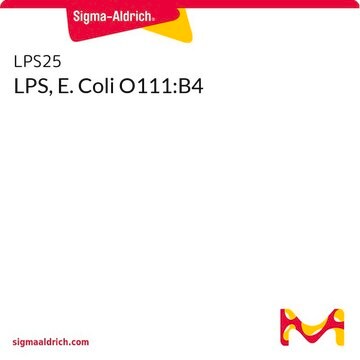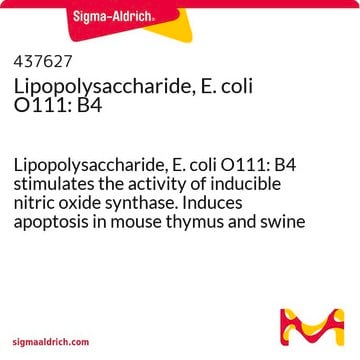Recommended Products
form
lyophilized
Quality Level
manufacturer/tradename
Calbiochem®
storage condition
OK to freeze
shipped in
ambient
storage temp.
2-8°C
General description
Formalin-fixed and heat-killed Staphylococcus aureus cells bearing protein A that bind to the Fc portion of human IgG subclasses 1, 2, and 4, and to IgG from other species (binding capacity: ≥2 mg human IgG/100 mg cells). Used for many purposes, including radioimmunoassays, enzyme immunoassays, agglutination, and immunoprecipitation of antigens. PANSORBIN also stimulates B-lymphocyte production and inhibits neoplasm growth. Lyophilized from preparations of Cat. No. 507858. Note: size of 5 g or 1 g refers to the wet cell weight.
Lyophilized from preparations of Cat. No. 507858. Note: size of 5 g or 1 g refers to the wet cell weight.
Packaging
Packaged under inert gas
Warning
Toxicity: Standard Handling (A)
Physical form
Lyophilized from PBS, 0.1% NaN₃.
Reconstitution
Following reconstitution, aliquot and refrigerate (4°C). Stock solutions are stable for up to 1 month at 4°C.
Reconstitute in sterile distilled H₂O.
Reconstitution with 10 ml sterile dH₂O yields a 10% (w/v) cell suspension.
Other Notes
Kierszenbaum, F., et al. 1991. Immunology74, 317.
Meikle, P.J., et al. 1991. J. Biol. Chem.266, 22569.
Ezaki, O., et al. 1989. Biochem. Biophys. Res. Commun.159, 1368.
Murakami, H., et al. 1988. Biochem. J.256, 917.
Kessler, S.W. 1975. J. Immunol.115, 1617.
Meikle, P.J., et al. 1991. J. Biol. Chem.266, 22569.
Ezaki, O., et al. 1989. Biochem. Biophys. Res. Commun.159, 1368.
Murakami, H., et al. 1988. Biochem. J.256, 917.
Kessler, S.W. 1975. J. Immunol.115, 1617.
Legal Information
CALBIOCHEM is a registered trademark of Merck KGaA, Darmstadt, Germany
PANSORBIN is a registered trademark of Merck KGaA, Darmstadt, Germany
Signal Word
Danger
Hazard Statements
Precautionary Statements
Hazard Classifications
Acute Tox. 3 Oral - Aquatic Chronic 3
Storage Class Code
6.1C - Combustible acute toxic Cat.3 / toxic compounds or compounds which causing chronic effects
WGK
WGK 3
Certificates of Analysis (COA)
Search for Certificates of Analysis (COA) by entering the products Lot/Batch Number. Lot and Batch Numbers can be found on a product’s label following the words ‘Lot’ or ‘Batch’.
Already Own This Product?
Find documentation for the products that you have recently purchased in the Document Library.
Eriko Kudo et al.
International journal of molecular medicine, 41(4), 2366-2374 (2018-01-18)
Copper metabolism Murr1 domain containing 1 (COMMD1) has multiple functions in the regulation of protein stability at the plasma membrane and in the cytoplasm. However, the regulation of COMMD1 transcriptional has remained to be elucidated. In the present study, the 5'‑flanking
Natalia Varlakhanova et al.
Molecular and cellular endocrinology, 332(1-2), 180-188 (2010-10-23)
The SMRT (Silencing Mediator of Retinoid and Thyroid hormone receptors) corepressor mediates gene repression by nuclear receptors and other transcriptional factors. The SMRT protein serves as a key nucleating core that organizes the assembly of a larger corepressor complex. We
Deborah L Burkhart et al.
PLoS genetics, 6(6), e1001003-e1001003 (2010-06-30)
The retinoblastoma tumor suppressor (Rb) is a potent and ubiquitously expressed cell cycle regulator, but patients with a germline Rb mutation develop a very specific tumor spectrum. This surprising observation raises the possibility that mechanisms that compensate for loss of
Jenny Hsu et al.
Nature communications, 10(1), 2939-2939 (2019-07-05)
E2F transcription factors are central regulators of cell division and cell fate decisions. E2F4 often represents the predominant E2F activity in cells. E2F4 is a transcriptional repressor implicated in cell cycle arrest and whose repressive activity depends on its interaction
Jiwon Hwang et al.
Methods (San Diego, Calif.), 55(2), 160-165 (2011-08-06)
Small ubiquitin-like modifiers (SUMOs) are covalently conjugated to target proteins to regulate numerous biological processes, including subcellular localization, protein-protein interactions, and transactivational activities. While the majority of identified SUMO targets are cellular proteins, SUMO modified viral proteins have also been
Our team of scientists has experience in all areas of research including Life Science, Material Science, Chemical Synthesis, Chromatography, Analytical and many others.
Contact Technical Service






